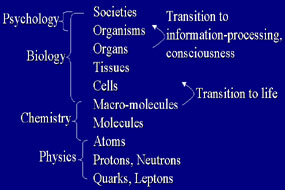Consciousness and Information ProcessingI want to switch now to talking about a non-reductive view not of life but of the mental, and you can probably guess where I'm going here. There's a perfect analogy between what the non-reductive physicalist wants to say about the mental and what the biologist wants to say about life. Life does not require a new kind of entity, that is, complex bodies have the quality of being alive if they interact with the environment in a special way. Similarly, mind is not a new kind of entity, rather complex living beings have mental qualities if they interact with the environment in a special way. So I've reconfigured the hierarchy a little bit. I've put societies at the top because mental functioning really does require social interaction. So I've added psychology to the hierarchy of the sciences and have indicated roughly a transition to information processing or consciousness. Hierarchy of Complex Systems
For the present purposes let's see if we can separate out the issues of information processing and consciousness. As has been noted by a number of philosophers, consciousness is really the hard problem but there's a whole lot we can say about information processing, which is equally an important aspect of the mental life. To show that it's possible to make a distinction between consciousness itself and the information processing aspect of the mental, consider a very interesting case of a neurological defect. These are people who have so-called blind sight; that is, they have damage to their visual cortex so they simply can't see. But with some of these people you ask them a question--for instance, is there a chair in front of you. And they'll say, well, what are you asking me for, you know I'm blind and I can't see. Well, I know you can't but just guess. Is there one there or not? And when they guess, many more times than they should right out of chance they can tell you that it's there; they can locate objects in what would be their visual field if they could see much better than they could if they were literally blind. And so what that shows is that they are actually taking in information about the world around them and they're processing it at some level so that they can act on it if you force them to but they're not consciously aware of that information. And so that shows that there is a distinction between consciousness and mere information processing. We could get the same point by trying to imagine the mental lives of very, very simple organisms, worms or whatever. We know that they take in information because if you touch them they move and all that sort of stuff. But we don't imagine that they've got a very interesting mental life and, in fact, I assume that they're not conscious at all. So even though we don't have any robust theories about the nature--the biological underpinnings of consciousness, the conscious aspect, we do know a whole lot about the neurobiological underpinning of information processing, and you heard a lot about that from our first lecture. For instance, with vision, we know that we've got two different kinds of receptor cells in the retina. Information from those cells is transmitted by the optic nerve to the brain. And we even know what parts of the brain, as you could see from the beautiful slides, are involved in visual processing. And, in fact, the victims of blind sight, they can find the actual lesions in the striate cortex. So the mental, as information processing at least, is clearly a biological function. It depends on the organization of certain kinds of cells, the neurons that got great pictures of this morning--capable of transmitting electrical impulses to a central processing organ, for us, the brain. And from that central processing organism to the muscles, etcetera. Now, consciousness--I won't say very much about this--but recall the title of my talk: Getting Mind Out of Meat. That comes from a line I read in one of Patricia Churchland's books. She says a lot of the arguments against physicalism are of the--I can't see how you could get ever get mind out of meat kind of arguments. So I just want to take a stand with the objectors who say that understanding consciousness really is the hard part of neurobiology. We do know a lot of things about it, it depends upon a highly complex central processing organ, the brain. It seems to result from the synchronised firing of lots of neurons--and I should say lots and lots and lots of neurons. And we know a lot about how to get rid of it--a bonk on the head, enough alcohol--whatever. So I would take my stand with other physicalists in that regard and say that there's no good reason to think that we cannot eventually come up with an account of the necessary and sufficient biological conditions for consciousness, just as we can talk about the necessary and sufficient conditions for life. Now, we may never know details about the phenomenal aspects of consciousness. For instance, why does grass produce the visual sensation that it does rather than the visual sensation that ripe tomatoes produce. Why is green green to us instead of the reverse or whatever.
|

